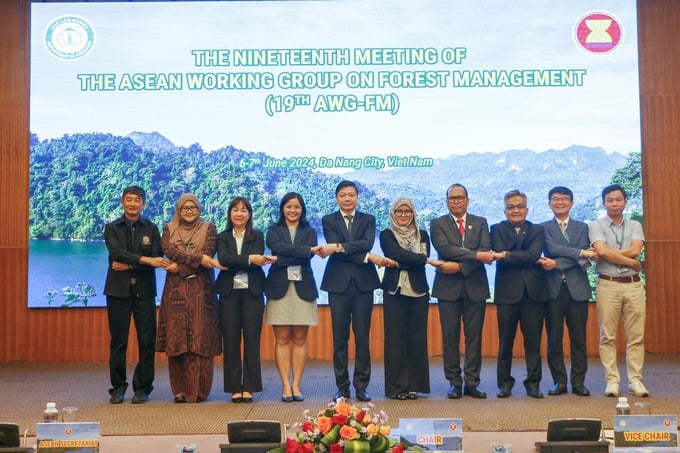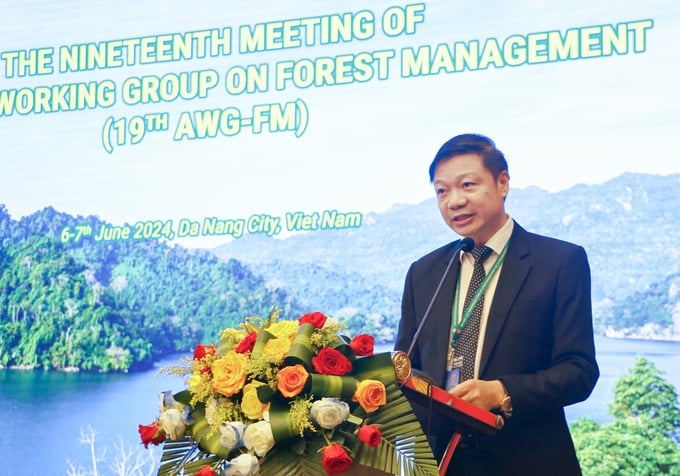November 28, 2025 | 04:18 GMT +7
November 28, 2025 | 04:18 GMT +7
Hotline: 0913.378.918
November 28, 2025 | 04:18 GMT +7
Hotline: 0913.378.918

The ASEAN community commits to sustainable forest management.
The conference was attended by ASEAN countries, the ASEAN Secretariat, leaders of the Department of Agriculture and Rural Development of Da Nang City, and representatives of several related international organizations. The conference was organized both in-person and online.
The ASEAN Working Group on Forest Management (AWG-FM) was established by ASEAN countries with the goal of promoting sustainable forest management and regional forest certification. The group also proposes related content on sustainable forest management to the ASEAN Senior Officials on Forestry (ASOF) in the future.
The AWG-FM conference is held annually on a rotating basis among ASEAN countries, aiming to promote cooperation and mutual support in sustainable forest management and forest certification. This contributes to the proper implementation of legal timber and timber product trade, mobilizes financial and technical resources to support forestry development, and enhances law enforcement capacity among ASEAN countries.
The 19th AWG-FM conference updated the forestry policies of ASEAN countries, enhanced the capacity of officials and communities participating in forestry, discussed the cooperation action plan among ASEAN countries, and updated the progress of implementing cooperation activities from the 18th session of the working group. Additionally, delegates discussed other related forestry issues of interest to ASEAN members.

Director of the Department of Forestry, Tran Quang Bao, speaks at the conference.
In his opening remarks, Director Tran Quang Bao, representing the host country, expressed his pleasure in welcoming delegates from ASEAN countries to this important event in Vietnam. He highly appreciated the efforts of the AWG-FM Working Group in connecting and supporting each other among ASEAN countries to develop sustainable forestry in the region.
Director Tran Quang Bao stated that ASEAN is a dynamically developing economic region, rich in cultural diversity, and abundant in forest resources. The development of the forestry sector in ASEAN countries has significantly contributed to economic growth, job creation, and poverty alleviation in rural and mountainous areas. This has also contributed to sustainable forest development, environmental protection, and the reduction of greenhouse gas emissions. However, the forestry sector still faces many difficulties and challenges.
"We need to continue enhancing the sharing and exchange of experiences and cooperate more closely to achieve the goal of sustainable forestry development in the region. This is one of the key factors in addressing the difficulties and challenges", emphasized Director Tran Quang Bao.
Translated by Hoang Duy

(VAN) On November 27, in the meeting with Minister Tran Duc Thang, Mayor Yin Yong shared Beijing’s experience to improve environment and air quality.

(VAN) After 30 years, both sides identified strategic areas of cooperation: sustainable production, increasing coffee value and training for farmers.
/2025/11/27/4910-4-164708_294.jpg)
(VAN) On the afternoon of November 27 in Beijing, Minister of Agriculture and Environment Tran Duc Thang held a working session with several major Chinese enterprises operating in the agriculture and environment sector.

(VAN) The Department of Animal Health issued a provisional guideline requesting local authorities to increase surveillance, collect samples for testing, and conduct epidemiological investigations according to the established procedure.

(VAN) The United Nations recommends that Vietnam utilize data and artificial intelligence to enhance early disaster warnings and reduce GDP losses by 3.2% in the context of climate change.

(VAN) On the morning of November 27 in Beijing, Minister Tran Duc Thang and the Deputy Commissioner General of the General Administration of Customs of China signed a protocol on fresh jackfruit exports.

(VAN) As floodwaters recede, a vast network of irrigation works across eastern Gia Lai is emerging in a state of severe disrepair, with extensive damage demanding urgent restoration ahead of the 2025-2026 winter-spring cropping season.